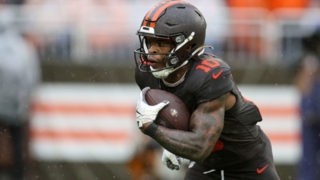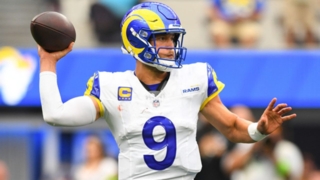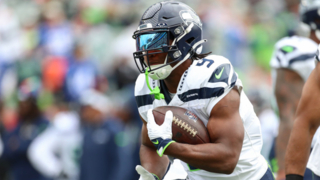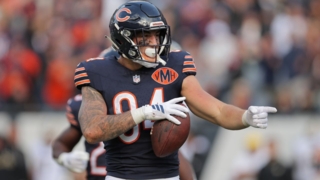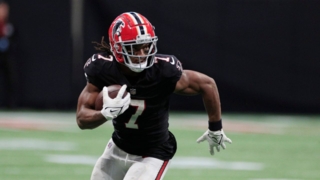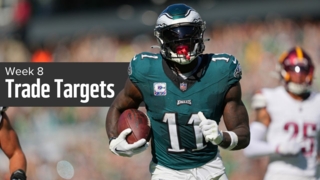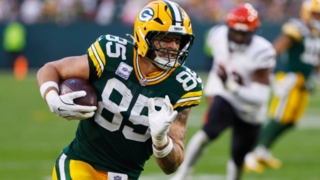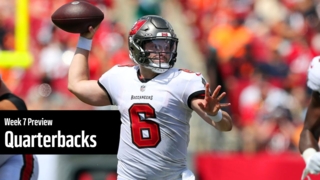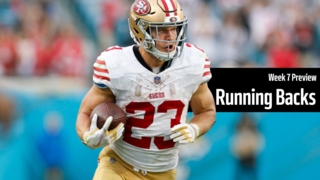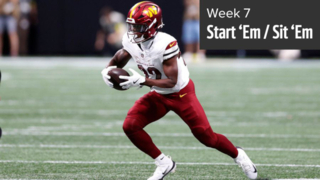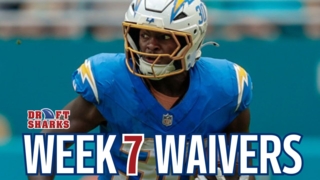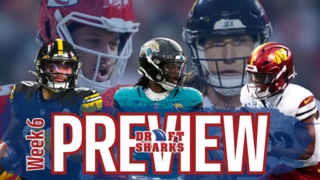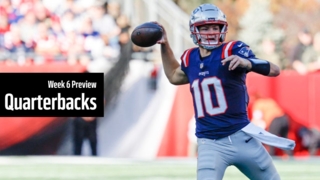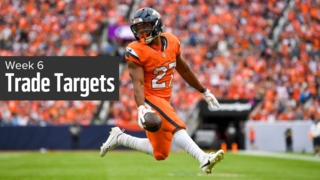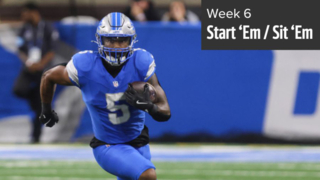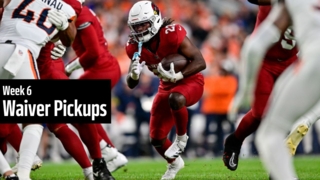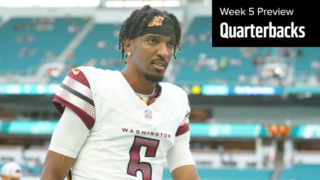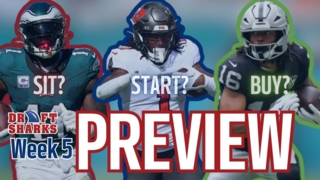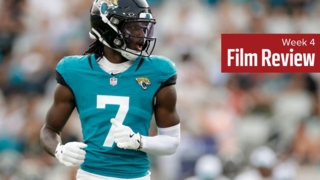In This Article
NFL Draft Impact: Dynasty Winners and Losers

Dynasty Winners
Davis Mills, QB, Texans
NFL Network’s Daniel Jeremiah said over the winter that the Texans believe in Mills as their 2022 starter.
It sounded a bit surprising then. Mills was a 3rd-round pick, albeit one with a strong pedigree dating back to high school. (He was a 5-star recruit.) Mills fell in the draft because of durability concerns — and a lack of starting experience.
He beat expectations as a rookie, completing nearly 67% of his passes and hitting 300 yards 4 times in 11 starts.
Now, with the NFL Draft over, we see the truth behind Jeremiah’s words. GM Nick Caserio had a chance to draft a QB — and at a discount — like Malik Willis (in Round 3) or Sam Howell (in Round 4).
But… nope.
“I believe in him [Mills], Pep Hamilton, second year in system, so many good things that he did. And that’s as a rookie,” HC Lovie Smith said last month. “The improvement you see from year one to year two is normally a big improvement and that’s what we’re going to see from him.”
Buying into that year 2 jump is easier post-draft. Houston added a day 1 upgrade in OG Kenyon Green. Round 2 brought WR John Metchie, an instant-impact slot if he can overcome a December ACL tear. For what it's worth, Metchie said at the Combine that he should be medically cleared “around June.”
The 2023 draft looks loaded with QBs, and a lot can change in one season. But for now, Davis’ dynasty value — mainly for 2-QB leagues — is holding up well.
Zach Wilson, QB, Jets
Wilson’s 2021 tape showed a guy that needs a lot of development.
Among 35 QBs with 200+ dropbacks, he ranked 33rd in adjusted completion rate, 33rd in Pro Football Focus passing grade and tied for 30th in yards per attempt.
He tossed only 9 TDs on 383 attempts (2.3% TD rate).
But with a first year HC/OC, the summertime loss of his QB coach and injuries to New York’s supporting cast, Wilson was dealt a difficult hand.
That all changes now.
The Jets added Garrett Wilson 10th overall, a pro-ready WR with big-time speed and separation ability. With Elijah Moore and Corey Davis, New York can confidently roll their 11 personnel.
Do-it-all RB Breece Hall arrived in Round 2, and Round 3 TE Jeremy Ruckert has developmental traits at nearly 6’6, 252 pounds.
A lot will ride on the O-line — particularly the status of OT Mekhi Becton, who’s struggled to stay healthy and keep his weight down. Overall, though, GM Joe Douglas has done well to build up an offense to maximize Wilson’s production.
Miles Sanders, RB, Eagles
2022 turns up a contract year for Sanders.
If this is it for him in Philly, he’ll have a chance to go out in style. WR A.J. Brown pairs with Jalen Hurts — only in year 2 as the starter — to supply explosive potential. A step forward in offensive production all but ensures a sizable rebound for Sanders in the scoring department. (Philly ranked mid-pack in yards and points per game in ’21.)
Recall that Sanders went without a TD last year, despite 163 touches.
Philadelphia also passed on adding a RB in the draft. Instead, they appear willing to enter the summer with Boston Scott and Kenneth Gainwell as complements.
So the 2022 setup looks nice. And if he delivers in the contract year, Sanders might be setup as a sell-high — especially with the 2023 draft stocked with RB talent.
Saquon Barkley, RB, Giants
Like Sanders, Barkley’s slated for free agency in 2023. The Giant will play on a 5th-year option this fall.
The macro case for Barkley starts like this: New York stunk as a unit last season. They ranked:
- 31st in total yards
- 31st in scoring
- 30th in yards per play
- 32nd in turnover rate
- 32nd in expected points
Mix in Barkley’s return from a September 2020 ACL tear and a fluke ankle injury last October, and looking back, he faced an insurmountable challenge.
No such excuses exist today.
Now healthy, Barkley will play for new HC Brian Daboll, who orchestrated Buffalo’s incredible rise over the past couple of seasons. The 25-year-old will do so behind an O-line that looks much improved, thanks largely to the arrival of Round 1 OT Evan Neal (all of 6’7, 337 pounds).
As a bonus, the Giants opted against adding an impact RB this offseason. Matt Breida followed Daboll from the Bills, but he’s not a serious threat. And despite holding 11 draft picks, the Giants never selected a RB.
While Barkley will almost certainly play elsewhere next season, he’s positioned nicely for a bounce-back. Early projections place him inside the top-8 RBs.
James Conner, RB, Cardinals
Conner’s a 27-year-old with ~900 career touches. He’s yet to play a full slate of games since entering the league in 2017.
Yet the team clearly believes in the former Steeler, inking him to a 3-year, $21 million deal in March. (The deal really locks Conner into Arizona’s backfield over the next 2 seasons.)
Can you blame them? Conner was a red zone weapon for the 2021 Cards, popping in 18 total TDs. He emerged as a pass catcher down the stretch.
The past few months have only reinforced the team’s confidence in the veteran. Chase Edmonds departed in free agency — his loss removes 116 carries (23.3%) and 53 targets (9.3%).
Arizona added a RB, but USC’s Keaontay Ingram wasn’t selected until Round 6. He’s not even a lock to make the Week 1 roster. Conner is set up for a massive workload.
Clyde Edwards-Helaire, RB, Chiefs
Now in year 3, 2022 shapes up as a make-or-break year for Edwards-Helaire.
Outside of a few games, he’s largely underwhelmed. Dropped into a perfect situation, he’s ranked 28th and 25th in PPR points per game. Injuries (ankle, hip, knee) have regularly popped up.
So we probably haven’t seen his best. CEH turned just 23 in April, though, and it’s worth remembering that he started just 1 season at LSU.
The K.C. front office is signaling that they still believe in him as a lead back. Ronald Jones arrived in free agency, but he’s a hot-and-cold runner that offers little as a pass catcher.
He also signed for “only” $750K guaranteed. That ranks outside the top-50 RBs.
The Chiefs held 10 picks in the draft but only added 7th-rounder Isaih Pacheco. He’s not a 2022 factor.
Rashod Bateman, WR, Ravens
How could we NOT call Bateman a post-draft winner?
Baltimore just passed on drafting a WR, while new Cardinal Marquise Brown leaves behind 146 targets on a 24.7% share. Bateman was already considered a rising talent. Now, he comfortably slots into 100+ targets alongside Lamar Jackson.
Bateman did miss 5 games last year following offseason groin surgery. But that marked his only missed action at any level of football. He’s fully healthy entering OTAs.
Only 22, we buy the high ceiling here.
Josh Palmer, WR, Chargers
As the draft neared, a belief emerged that Los Angeles might select a Round 1 WR.
The approach? To strengthen a strength, rather than patch a weakness.
But the board didn’t fall that way. So GM Tom Telesco opted to bolster Justin Herbert’s protection with OG Zion Johnson. In fact, the Bolts passed on a WR at any stage in the draft.
Palmer, a 2021 third rounder, brings below average athleticism but plus size and length. If he can beat out Jalen Guyton to earn a big enough chunk of the #3 WR job, we could see a continuation of his promising end to ’21. Note that Palmer saw a ~17% total target share in 4 of his final 5 games, scoring 3 times.
Terrace Marshall, WR, Panthers
Marshall had a train wreck of a rookie season.
Across 13 games, he mustered only 138 yards on 17 catches. Among 120 WRs with 30+ targets, he ranked last in yards per route run; 4th to last in PFF receiving grade.
He handled 30 targets — 5.2% — even with disappointing seasons from Robby Anderson and Christian McCaffrey.
That said, it’s premature to call this guy a bust. After all, the former 2nd-rounder played last year at only 21 years old. He’s still a plus athlete with excellent length — we just didn’t see it last year, and the supporting cast didn’t help.
Carolina added a potential answer at QB with Matt Corral. And they passed on adding a WR to compete with Marshall for a top-3 job. Plus, there’s still a chance the team moves on from Anderson, who’s been the subject of trade rumors.
Irv Smith, TE, Vikings
Here’s where we’re at with Smith and his 2022 setup:
- He enters a contract year in the fall.
- He missed all of 2021 with a torn meniscus.
- The Vikings hired a new HC (Kevin O’Connell) and GM (Kwesi Adofo-Mensah) over the winter.
- TE Tyler Conklin signed with the Jets in free agency.
Despite all of that, the Vikings only added 7th-round TE Nick Muse in the draft. He’s not a ’22 factor.
At least to this point, nobody of note signed in free agency.
All of that signals a belief in Smith getting back to the athletic, catch-first TE he was pre-injury. Recall that Smith ranked as a top-8 fantasy TE over his final 6 games of 2020.
Dynasty Losers
Justin Fields, QB, Bears
Fields was hung out to dry as a rookie.
Allen Robinson missed 5 games and labored through his worst season when active. Elsewhere, this squad simply lacked difference-makers.
The same held true along the O-line. Per Football Outsiders, the Bears allowed a league-high 9.5% adjusted sack rate.
Now, year 2 gives way to a new coaching staff. But no major O-line upgrades. And no significant WR additions.
Third-round WR Velus Jones provides some big-play pop. Maybe — maybe — he’ll pair well with Fields' excellent deep ball. Jones just doesn’t profile as a steady, long-term contributor. We’re talking about a 25-year-old rookie who topped 280 yards in just 1 of 6 college seasons (807 in 2021).
Perhaps he’s an outlier. But it’s simply bad process to bet on a guy with Jones’ pedigree.
The Bears will enter 2023 with a ton of cap space, so year 3 could be where they really stock up. Still, it’s puzzling as to why this braintrust is essentially wasting another year of Fields’ rookie deal.
Antonio Gibson, RB, Commanders
Last year, Gibson battled injuries for the second straight season.
Playing through a stress fracture in his shin, he fell shy of expectations with a PPR RB17 finish. He finished under 10 PPR points in 6 of 16 games.
Only 24 (in June), it’s worth remembering that Gibson was primarily a pass-catcher at Memphis. He exited school with a stunningly low 33 career carries (all in 2019).
Washington seems to be running thin on patience, though. First came the re-signing of pass-catching back J.D. McKissic, who returned on a 2-year, $7 million deal.
Then last week, early-down thumper Brian Robinson joined the squad as a 3rd-round pick. Note that current GM Martin Mayhew didn’t draft Gibson.
Keep in mind that Washington lost its best O-linemen OG Brandon Scherff, too.
Now, HC Ron Rivera comped the Gibson-Robinson backfield to a pair he coached 10+ years ago — Jonathan Stewart and DeAngelo Williams, who essentially split backfield work down the middle. Bottom line: Gibson’s dynasty value simply isn’t what it was a few months ago.
Rashaad Penny, RB, Seahawks
You know about Penny’s epic run to end last season. Over the final 5 weeks, he easily paced all RBs in fantasy scoring.
Seattle rewarded him with a fresh 1-year deal worth ~$5.7 million. Not bad for a guy with little on his résumé beyond the monster finish.
Unfortunately for fantasy owners, the team invested a Round 2 pick in MSU’s Kenneth Walker. A Nick Chubb-like runner, Walker projects as a day 1 asset.
Volume was always critical for Penny given his lack of receiving upside -- and Seattle’s mess at QB.
You could point to Penny’s 1-year deal and say he’ll find a better situation next offseason. Sure, it’s possible. But he’ll be 27 next February and very likely coming off a less productive end to the season than he was in 2021.
Michael Carter, RB, Jets
A former 4th-round pick, Carter stands just 5’8, 201 pounds.
At bottom, he was always a long-shot for multi-year, lead-back work.
That reality officially set in last week when New York traded up 2 spots for Breece Hall. Hall has ~15 pounds on Carter, plus a superior athletic and production profile.
We’re not saying Carter will become a fantasy zero — he should retain a role that’ll afford some PPR value. He’s just no longer carries a top-20 ceiling as a Jet.
Devin Singletary, RB, Bills
Singletary put together a career year in 2021. He really emerged down the stretch, scoring 9 times over his final 6 contests.
Singletary’s efforts weren’t enough to prevent Buffalo from pursuing an upgrade, though. Rumored to have Round 1 interest in RB Breece Hall, the Bills instead spent a Round 2 pick on James Cook.
At a minimum, Cook figures to take a bite out of Singletary’s 8.0% target share and 9.6% reception share. His FSU tape showed a dynamic pass catcher that can attack defenses from any alignment.
Note that Singletary is entering a contract season. Only 25 (in September), we’d be surprised if he doesn’t at least test free agency.
Elijah Mitchell, RB, 49ers
Credit the 49ers for finding Mitchell in Round 6.
The speed back flourished under HC Kyle Shanahan, hitting 80+ rushing yards in 8 of 11 games. His efficiency was strong at 4.7 yards per carry — plus 0.59 rushing yards over expected per attempt (per Next Gen Stats). The former mark ranked 7th among qualifying RBs.
The arrow seemed to be pointing up.
Then fantasy owners were served a reality check during the draft. After losing Raheem Mostert in free agency, San Francisco opted to use a Round 3 pick on LSU RB Tyrion Davis-Price.
As a junior, Davis-Price had a breakout 2021 (211-1,003-6 rushing in 12 games). He ran a 4.48 forty at 211 pounds, giving him an 89th percentile speed score.
The selection was generally thought of as a reach based on pure grades. While his RB picks don’t always pan out, we’ll go ahead and say Shanahan knows what he likes.
Ultimately, San Francisco’s backfield is now Patriots-level muddy. We can’t even dismiss Trey Sermon, who did nothing as a rookie but is still entering just his 2nd season as a former 3rd-rounder.
A.J. Brown and DeVonta Smith, WRs, Eagles
We love Brown’s skill set.
We love Smith’s skill set.
But as teammates… and for fantasy?
That’s a tough sell.
Last year, the Titans ranked 31st in pass rate (51.2%). The Eagles ranked last (50.1%).
We expect the Eagles to pass more this season, but they're not gonna turn pass-heavy as long as Jalen Hurts is at the helm. So team pass volume isn’t spiking considerably for Brown. And Smith looks like the most talented WR he’s shared a field with to date. (You have to factor in Dallas Goedert, too. He just signed an extension last year.)
The same point holds true for Smith. He’s still an ascending talent, but he carried ~150 target upside prior to the trade. That’s now gone.
Both guys could recover if Hurts takes a big step forward as a passer. We just can’t assume that’ll happen. His limited 2020 sample turned up a 57.5 PFF passing grade, while 2021 produced a 69.2 mark (20th among 35 qualifiers). Hurts ranked just 28th in adjusted completion rate, which omits throwaways, batted balls, spikes and drops.
Amon-Ra St. Brown, WR, Lions
The Lions not only traded up for ‘Bama speedster Jameson Williams. They traded up 20 spots to get their guy 12th overall.
“This guy's gritty. He's a dog. He loves football. He just fit what we're about,” GM Brad Holmes said post-draft. “Once the conviction and the buy-in kept rising, then I started saying, 'OK, alright, maybe being that he's one of those guys that we had graded similarly, very evenly up at the top, let's go get him.’”
The Lions had a high grade on Williams… and they acted on it.
That move alone stings for St. Brown, who ended last season on a 6-game heater. Point to Detroit’s depleted pass-catching corps if you want, but the rookie still delivered with the WR8 finish over that stretch. He caught 8+ balls in each of those games. And he even started seeing manufactured touches as a ball-carrier.
Detroit also added D.J. Chark in free agency. A 2021 non-factor (broken ankle), Chark, only 25, has the ability to reemerge as a valuable real life starter. He joins a suddenly loaded cast of pass catchers that also includes T.J. Hockenson and D’Andre Swift.
Mecole Hardman, WR, Chiefs
The Chiefs lost 260 targets with the offseason departures of Tyreek Hill, Byron Pringle and Demarcus Robinson.
Good news, right?
Sure… had GM Brett Veach not aggressively replenished WR:
First came the signing of JuJu Smith-Schuster.
Then came the addition of Marquez Valdes-Scantling.
And finally -- the kick in the pants for Hardman -- the arrival of reliable, explosive slot Skyy Moore.
So their actions show they’re not ready to significantly elevate Hardman. Facing a contract year, it’ll be interesting to see if he returns to Kansas City on a short-term deal.
If not, it’s hard to imagine Hardman finding a better landing spot on the open market.
Albert Okwuegbunam, TE, Broncos
Okwuegbunam exited Missouri as a raw prospect with elite height/weight/speed.
A mid-2020 ACL tear stunted his growth. Yet he showed enough alongside Noah Fant last year (30-330-2 on 40 targets in 14 games) to get a look as Denver’s TE1.
With the arrival of new HC Nathaniel Hackett, an unestablished player like Albert O will get a fresh start. Hackett said back in March that the 3rd-year TE will be used more as a “move tight end” and a hybrid receiver/tight end.
One thing to keep in mind: GM George Patton wasn’t the one to draft Okwuegbunam in 2020. So we shouldn’t be too surprised about the arrival of rookie 3rd-rounder Greg Dulcich, a top-3 TE in this class according to most draft analysts. He doesn’t have Okwuegbunam’s top-end speed or length, but he's not exactly a blocking TE, either.
We know it’s rare for rookie TEs (not named Pitts) to produce in fantasy. But the mere potential for Dulcich to emerge as the position leader by 2023 only lowers Albert O’s floor. And it takes on even greater importance with Denver’s fierce target competition at WR.
We have the tools to help you manage your team like a real NFL GM. Coaches like Belichick, McVay, and Reid all have an entire analytics team at their disposal -- from Draft Night and through the offseason. Now you do too!
With tools that:
- Customize and sync to your league scoring. Plug-and-Play functionality.
- Auto-adjust during your draft(s) based on positional scarcity, player availability, and individual team needs.
- Look to the future with 1-, 3-, 5-, and 10-yr projections.
- Contain detailed breakdowns for trade analysis, start-sit decisions, and waiver wire management.
We’ve built a whole suite of Dynasty Tools to help you draft, trade, and research like a champion. You're the manager. We're here to help.
Explore Your New Dynasty Tools »
 Redraft
Redraft Dynasty
Dynasty Best Ball
Best Ball
